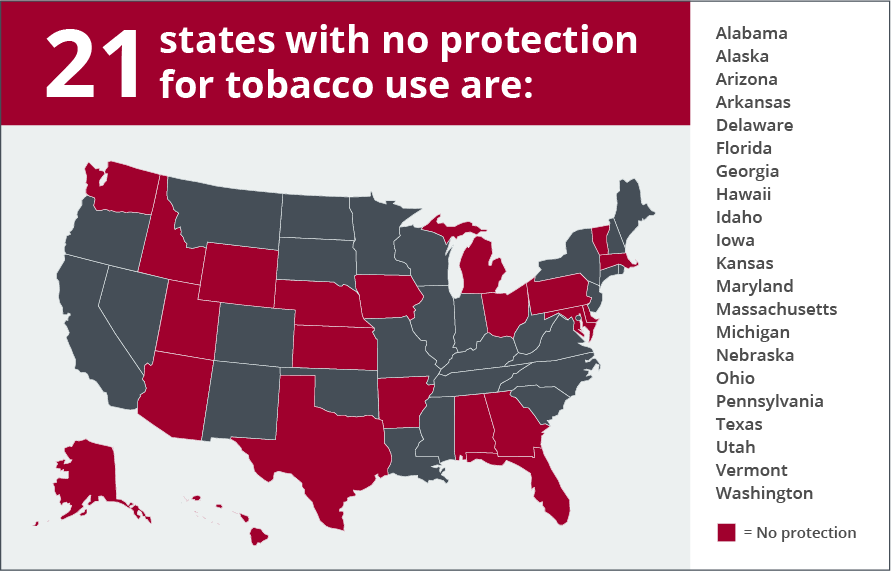Should a hybrid work or remote workers policy for tobacco use be the same as the policy for on-site workers?
Both fully remote and hybrid work options present challenges to adopting, implementing, and enforcing tobacco use policies at work.
That’s because most tobacco use policies are tied to the employer-owned physical spaces in which employees work, such as offices, company campuses, and company vehicles.
But when you remove these physical spaces from the tobacco use policy, there can be confusion as to when the policy applies or how it can be enforced. Here’s what you need to know.
When can workplace tobacco use policies apply during remote/hybrid work?
First, it is important to define the typical workplace tobacco use policy. A typical policy may prohibit employees from using tobacco products while at work; that is, while on the employer’s premises during working hours. A tobacco use policy may allow for limited tobacco use in designated areas during designated “break” times during the workday, but not necessarily.
Finally, employers may offer incentives for avoiding tobacco products through their health insurance offerings; tobacco users may pay more for their health insurance premiums than nonusers. Varying premiums by 50% for tobacco users is legally permissible under the Affordable Care Act premium rating and wellness incentive rules.
See more in my blog “What is a Tobacco Surcharge and How Does My Company Offer One?”
Although employer-sponsored health plans may legally vary premiums based on tobacco use under federal law, state law may prevent employers from penalizing employees who use tobacco.
Be aware of state protections for tobacco users
According to the National Conference of State Legislatures, 29 states plus the District of Columbia have laws that offer some form of protection to tobacco users. However, 21 states have no laws that protect tobacco users.
Employers operating in one of these “no protection” states could prohibit employees who work remotely from using tobacco, but those employers might face employee backlash for invading their privacy at home.
Most states recognize a general right to privacy, either through case law or statute. The most common violation of privacy is described as follows: One who intentionally intrudes, physically or otherwise, upon the solitude or seclusion of another or his private affairs or concerns, is subject to liability to the other for invasion of his privacy if the intrusion would be highly offensive to a reasonable person.
However, if an employer in a “no protection” state has a clear, written policy that prohibits use of tobacco products “while working” (as opposed to “while at the employer’s facility”), the employer may be able to enforce such a policy.
Any definition of “workplace” in an employer’s tobacco use policy should include “any area used by an employee while in the performance of their job duties.” Including that phrase or a similar phrase in the definition of “workplace” should encompass not only the employee’s home, but any other remote location at which the employee could work (such as a restaurant, bar, or other public or private building).
Employers who operate in states that do protect tobacco use outside of work would face similar invasion of privacy hurdles but should also carefully examine the wording of the tobacco use protection statutes.
Many state laws that protect tobacco use by employees phrase the protection as existing during “nonworking hours” and off the “employer’s premises.” (See e.g., CA Labor Code § 96, Colo. Rev. Stat. § 24-34-402.5, Minn. Stat. Ann. § 181.938, Mo. Rev. Stat. § 290.145, Mont. Code Ann. § 39-2-313 and 314, Nev. Rev. Stat. Ann. § 613.333, N.Y. Labor Code § 201-d, N.C. Gen. Stat. § 95-28.2, N.D. Cent. Code § 14-02/4-03, S.D. Codified Laws § 60-4-11, W. Va. Code § 21-3-19, Wis. Stat. Ann. § 111.321.)
In these “premises/nonworking hours” states, it would be more difficult to enforce a tobacco-use policy for remote workers.
Avoiding confusion when enforcing no tobacco use in remote workers policy
It is unclear what a court would do if an employee sued an employer for discriminating against their tobacco use at home during working hours.
To help avoid legal confusion, employers could clarify what constitutes “working hours” in their tobacco use policies, even when employees work remotely. For example, employers could define “working hours” as anytime employees are performing job duties or when they are “on call.”
Clarifying the definition of “working hours” in the states that use that language in their tobacco use protection statutes could help employers fight against an employee’s discrimination claim.
Most of the remaining states that have tobacco use protection laws protect tobacco use outside the “course of employment.” These states would be easier to implement a tobacco use policy for remote workers because the statutory language does not consider where the tobacco use occurs. Rather, the statutes only care if tobacco use occurs during the “course of employment,” which could easily encompass remote work.
Like the suggested language for the “premises/nonworking hours” states, employers operating in the “course of employment” states should ensure their tobacco use policy is clear. Their policy should state that tobacco use is not allowed by remote workers while performing the duties of their job or when they are “on call.”
How can employers enforce compliance?
Even if employers implement tobacco use policies for remote or hybrid workers, enforcement of those policies will be challenging. As noted earlier, any policy that aims to control what employees do in the privacy of their own home, even during working hours, runs the risk of facing an invasion of privacy lawsuit.
Short of installing cameras inside an employee’s home or catching an employee using tobacco during a video call, it will be difficult for an employer to know, much less prove, that an employee is violating the tobacco use policy.
If the tobacco use policy is tied to a workplace wellness program that aims to detect the presence of nicotine in an employee’s bloodstream, then the employer may be able to monitor compliance more accurately.
Of course, such wellness programs must comply with wellness incentive rules under the Affordable Care Act (if the incentive is tied to health insurance premium differentials) as well as the Americans with Disabilities Act.
See more in my blog “Tobacco Surcharge on Health Insurance in Legal Crosshairs: Is Your Wellness Program Compliant?”
These laws place limits on the amount of incentives the employer can offer employees and require reasonable alternatives to earn those incentives if the employee continues to use tobacco.
To learn more about complying with these incentive laws, please see Chapter Four in Rule the Rules of Workplace Wellness Programs.
All this to say, implementing workplace wellness programs might be the answer for employers who wish to enforce a tobacco use policy for remote or hybrid workers.
For more information about legal considerations with tobacco surcharges, please connect with me at Center for Health and Wellness Law, LLC.
**Please Note: Nothing contained in this blog post is to be construed as legal advice. This blog post is for informational and educational purposes only. Readers are encouraged to seek legal counsel for any advice or compliance determinations needed on specific situations.**





